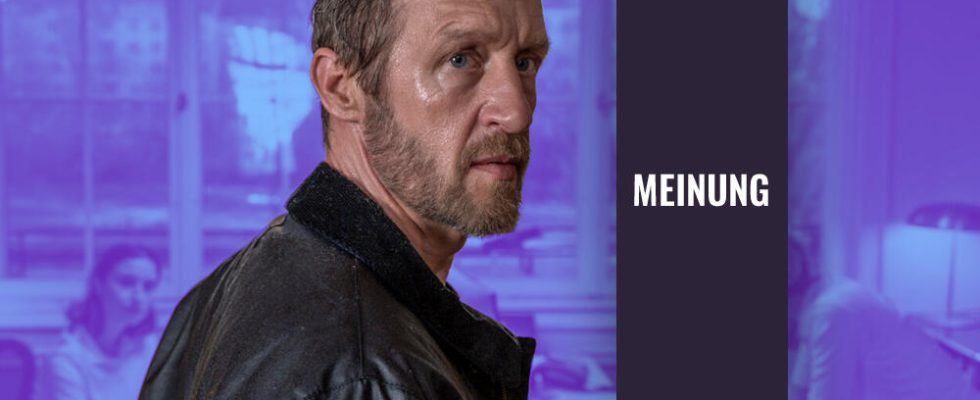I watched 46 new series and series seasons this year and nothing excited me as much as the end of The Therapy. The fact that the Amazon film adaptation of Sebastian Fitzek’s bestseller was such a huge success for the streamer makes me shudder. She trivializes the crime of a father against his daughter. Worst of all, no one seems to care.
Spoilers for the entire first season of The Therapy follow.
I wish I had stopped The Therapy after episode 1
The entire story of The Therapy is completely crazy – which makes the miniseries a crazy but entertaining psychological thriller until shortly before the end. I wish I had switched off straight away and not allowed myself to be tied up in the first place to save myself the later outburst of anger over the ending.
At the beginning we think that a psychiatrist (Stephan Kampwirth) lost his daughter (Helena Zengel) at the pediatrician. The 13-year-old disappears without a trace during the doctor’s visit. On the anniversary of the disappearance, the father retreats to a holiday home on an island. A woman looks for him there. She wants therapy, but also seems to know something about the missing girl. A struggle for information ensues. In flashbacks we learn about family life before the daughter’s disappearance a big twist at the end fills dozens of narrative gaps. Hold on tight!
Amazon
Josy and Viktor Larenz
The father is actually in a coma, is mentally ill and has put the whole island thing together to cope with reality. In reality, he has his daughter kept sick for years with small microdoses of rat poisonso that she doesn’t fledge. When he finally kills her in his madness, the mother is able to revive her and keeps her hidden from him from then on. Sounds wild, but at this point the series could actually have turned a corner.
The final scene of the Amazon series had me screaming at my television
The perpetrator could have faced consequences for his crime in the end, but the finale clearly decides against this in terms of narrative and style. As he gets closer to the truth in his island fantasy, the father wakes up from his coma. But instead of being handed over to the police or sent to a closed institution, he is dropped off at the doorstep of his wife and daughter by his doctor himself – and the mother, who has hidden her child from his murderer for years, lets him in. What follows works like a tearful reconciliation after a trivial argument.
The father leaves the two with the satisfaction that his daughter is now happier than before and a sentimental pop song starts, as if a bittersweet teen drama is ending. That in itself is worth a major tantrum. But it gets worse.
In the final scene, the makers of the Amazon series miss their last chance to give the daughter her own voice and demonstrate a minimum level of reflection. In the epilogue, the now 16-year-old decides to pay her father a visit a few years after the events. Instead of sitting in a closed institution or a cell, he is treated as a nursing case in a beautiful house. Open balcony door, sunshine, gentle breeze, all of it.
He has completely withdrawn into himself and dreams of being back on the fictional island from the beginning of the series. Instead of just watching her daughter disagree with him, come to terms with him, allow her wounds to heal, and finally, self-determinedly leave him, she places her hand on his and whispers gently: “Hello, Dad!”
The series ends in the psychiatrist’s fantasy. He, in his imaginary holiday home on the island, with his daughter. Sentimental music plays, wind rustles through trees, tears flow and he is happy. End. I could puke. What the hell?
The end of The Therapy trivializes physical and emotional child abuse
Abuse has many faces. In this case the father was so afraid of loss that he… caused severe physical and emotional harm to his daughter for the sake of his own spiritual well-being has. But not only does the daughter as a person play no role at all in the series, we are also told about the father’s trauma in a highly emotional flashback. The series is always on his side. The story is told from his point of view, his tears are cried, his crime is explained and even almost excused through this narrative style.
Ultimately, the therapy aims to convince me that three years later the abuse no longer has any negative consequences, neither for the perpetrator nor for the victim. Instead, everyone is finally happy in their own way. sorry, but I can’t let that get away with a totally crazy mindfuck thriller. Especially not when he was so extremely successful.
I scoured the internet for opinions on this ending, but the WTF cries, tantrums, and teardowns were completely absent. In 2023 we should be sensitized enough to not accept this trivialization for a few cheap thrills. Not even if the therapy tries to drown every negative feeling in whistling pop.
